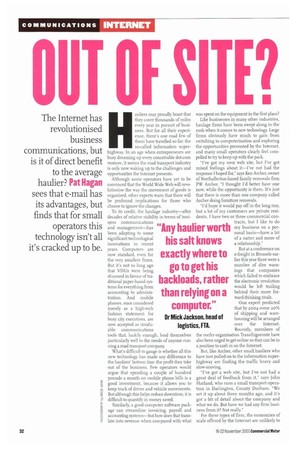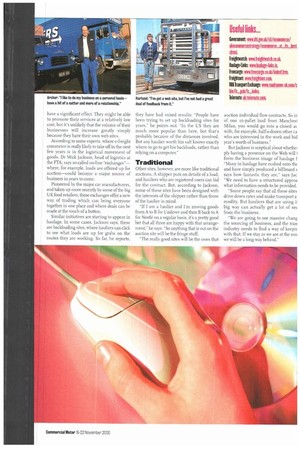UT
Page 34

Page 35

If you've noticed an error in this article please click here to report it so we can fix it.
SITE?
The Internet has revolutionised business communications, but is it of direct benefit to the average haulier? Pat Hagan sees that e-mail has its advantages, but finds that for small operators this technology isn't all it's cracked up to be. H auliers may proudly boast that
they cover thousands of miles every year in pursuit of business. But for all their experience, there's one road few of them have travelled so far: the so-called information super highway. In an age when entrepreneurs are busy dreaming up every conceivable dot.com venture, it seems the road transport industry is only now waking up to the challenges and opportunities the Internet presents.
Although some operators have yet to be convinced that the World Wide Web will revolutionise the way the movement of goods is organised, other experts warn that there will be profound implications for those who choose to ignore the changes.
To its credit, the haulage industry—after decades of relative stability in terms of business communications and management—has been adapting to some significant technological innovations in recent years. Computers are now standard, even for the very smallest firms. But it's not so long ago that VDUs were being shunned in favour of traditional paper-based systems for everything from accounting to administration. And mobile phones, once considered merely as a high-tech fashion statement for busy city executives, are now accepted as invaluable communications tools that, luckily enough, lend themselves particularly well to the needs of anyone running a road transport company.
What's difficult to gauge is whether all this new technology has made any difference to the hauliers' bottom line: the profit they take out of the business. Few operators would argue that spending a couple of hundred pounds a month on mobile phone bills is a good investment, because it allows you to keep track of driver and vehicle movements. But although this helps reduce downtime, it is difficult to quantify in money saved.
Similarly, a good computer software package can streamline invoicing, payroll and accounting systems—but how does that translate into revenue when compared with what was spent on the equipment in the first place?
Like businesses in many other industries, haulage firms have been swept along in the rush when it comes to new technology. Large firms obviously have much to gain from switching to computerisation and exploring the opportunities presented by the Internet, and many small operators clearly feel compelled to try to keep up with the pack.
"I've got my own web site, but I've got mixed feelings about it—I've not had the response I hoped for," says Ken Archer, owner of Northaller ton-based family removals firm PW Archer. "I thought I'd better have one now, while the opportunity is there. It's just that there is more than one company called Archer doing furniture removals.
"I'd hope it would pay off in the long run, but a lot of my customers are private residents. I have two or three commercial contracts, but I like to do my business on a personal basis—have a bit of a natter and more of a relationship."
But at a conference on e-freight in Brussels earlier this year there were a number of dire warnings that companies which failed to embrace the electronic revolution would be left trailing behind their more forward-thinking rivals.
One expert predicted that by 2004 some 20% of shipping and warehousing will be arranged over the Internet. Recently, members of the reefer organisation Transfrigoroute have also been urged to get online so they can be in a position to cash in on the Internet.
But, like Archer, other small hauliers who have just pulled on to the information superhighway are finding the traffic heavy and slow-moving.
"I've got a web site, but I've not had a great deal of feedback from it," says John Harland, who runs a small transport operation in Darlington, County Durham. "We set it up about three months ago, and it's got a bit of detail about the company and what we do. But have we had any firm business from it? Not really."
For these types of firm, the economies of scale offered by the Internet are unlikely to have a significant effect. They might be able to promote their services at a relatively low cost, but its unlikely that the volume of their businesses will increase greatly simply because they have their own web sites.
According to some experts, where e-freight commerce is really likely to take off in the next few years is in the logistical movement of goods. Dr Mick Jackson, head of logistics at the FTA, says so-called on-line 'exchanges"— where, for example, loads are offered up for auction—could become a major source of business in years to come.
Pioneered by the major car manufacturers, and taken up more recently by some of the big UK food retailers, these exchanges offer a new way of trading which can bring everyone together in one place and where deals can be made at the touch of a button.
Similar initiatives are starting to appear in haulage. In some cases, Jackson says, these are backloading sites, where hauliers can click to see what loads are up for grabs on the routes they are working. So far, he reports,
they have had mixed results: -People have been trying to set up backloading sites for years," he points out. -In the US they are much more popular than here, but that's probably because of the distances involved. But any haulier worth his salt knows exactly where to go to get his backloads, rather than relying on a computer."
Traditional
Other sites, however, are more like traditional auctions. A shipper puts on details of a load, and hauliers who are registered users can bid for the contract. But, according to Jackson, some of these sites have been designed with the interests of the shipper rather than those of the haulier in mind.
"If I am a haulier and I'm moving goods from A to B for Unilever and then B back to A for Nestle on a regular basis, it's a pretty good bet that all three are happy with that arrangement," he says. "So anything that is out on the auction site will be the fringe stuff.
"The really good sites will be the ones that auction individual flow contracts. So in of one ro-pallet load from Manchesi Milan, you would go into a closed ai with, for example, half-a-dozen other ca who are interested in the work and bid year's worth of business."
But Jackson is sceptical about whethei ply having a presence on the Web will I form the business image of haulage f "Many in haulage have rushed onto the and have simply produced a billboard says how fantastic they are," says Jac "We need to have a structured approa what information needs to be provided.
'Some people say that all these sites drive down rates and make transport a modity. But hauliers that are using ii big way can actually get a lot of se< from the business.
"We are going to see massive chanp the sourcing of business, and the tran industry needs to find a way of keepir with that. If we stay as we are at the mo we will be a long way behind."








































































































